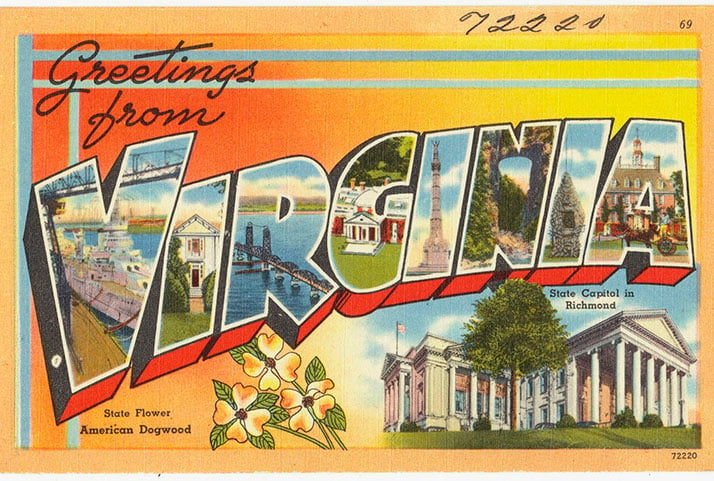Donald Trump became president by flipping states no Republican nominee had won in nearly 20 years. This time he’s trying to win those same states back—but he also has the chance to pick up another target that’s long eluded the GOP.
Virginia has gone blue in every presidential election since 2004. Four years ago, Trump lost the state to Joe Biden by 10 points. Nobody considered Virginia a battleground this year. Yet the most recent surveys show a state distinctly in play.
Late last month a Roanoke College poll found Trump and Biden tied, 42-42. Biden was already looking anemic in a January poll by Virginia Commonwealth University, which had him ahead by just 3 points. What’s happening in Virginia is that the Democrats’ coalition is cracking even as Biden’s gruesome foreign-policy record helps heal divisions within the GOP.
Trump is in a position to win “NeverTrump Republicans”—or NearlyNeverTrumpers—for the first time, while Biden is losing ground with the rural and working-class whites Democrats still need to win in places like Virginia.
For Republicans and Democrats alike, Virginia exemplifies cultural and demographic battlelines that run across several hotly contested states, including Georgia, North Carolina, and Pennsylvania. Hillary Clinton recognized this in 2016, when she picked Virginia Sen. Tim Kaine as her running mate.
Virginia seemed set to become part of the Republican “solid South” in the 1990s, as middle-class evangelicals and less affluent whites coalesced. A growing tech sector (also a feature in North Carolina) and the always burgeoning Washington, D.C., suburbs, packed with government workers and contractors, reinforced the Democrats’ side—but they weren’t enough.
So in the 2000s Virginia Democrats made a point of fielding candidates like Kaine and former Reagan administration Navy secretary James Webb, who switched parties and won a strenuously contested U.S. Senate race that decided control of the chamber in 2006. Webb and Kaine were appealing to rural and working-class whites.
Whenever the party failed to court those unfashionable voters, it risked defeat: hence the near upset in 2014 that almost cost Democrat Mark Warner his U.S. Senate seat. Clinton crony Terry McAuliffe was never strong with the kind of voters who responded well to Webb and Kaine, with the result that he only narrowly won a gubernatorial race in 2013 and lost a second in 2021.
Virginia’s elections that year, which made Glenn Youngkin governor and swept a slate of Republicans into statewide office, were rightly seen as a humiliation for Biden. While three years might feel like a long time in politics, Biden’s weakness today was presaged by the Democrats’ debacle of ’21.
Trump might have made inroads in the state in 2016, but with Kaine bolstering Clinton’s ticket, the Republican lost by 5 points. And with Biden campaigning as a white Democrat of an older generation, while suburbanites repudiated Trump amid the upheavals of 2020, Virginia delivered excellent numbers for the Biden-Harris ticket last time.
But this time is different.
After four years in office, Biden seems less like a Jim Webb Democrat than a Terry McAuliffe or worse—unwilling or unable to resist the party’s cultural lurch to the left. The botched withdrawal from Afghanistan and the continuing crises in Israel and Ukraine, meanwhile, have forced suburban Republicans who would prefer a George W. Bush to Donald Trump to rethink their comfort with Biden as an alternative to a right-wing populist.
Former Weekly Standard editor Bill Kristol, a longtime denizen of McLean, Virginia, may still be a NeverTrumper, but other Republicans who distanced themselves from the party after its takeover by Trump have now remembered why they never voted Democrat before.
Biden received the benefit of the doubt in 2020 from suburbanites who wanted competence and calm. He won’t get that this year, after the record he’s run up.
Trump will never be the first choice of well-to-do and college-educated Republicans who admire leaders like Youngkin or Georgia Gov. Brian Kemp. But this year he will be their choice over Biden—if he can avoid needlessly antagonizing them.
Trump’s feuds with the likes of Kemp and former Maryland governor (and now U.S. Senate candidate) Larry Hogan only cost him GOP votes that would otherwise be his automatically. In 2020, that lost Georgia for Trump. He shouldn’t let it spoil his shot at Virginia this November.
If Trump accepts the gift Biden is giving him—a united GOP and splintered Democratic Party—he’ll make his own ’16 victory seem like it was just a warm-up.
COPYRIGHT 2024 CREATORS.COM

Leave a Reply